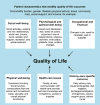Conversations for providers caring for patients with rectal cancer: Comparison of long-term patient-centered outcomes for patients with low rectal cancer facing ostomy or sphincter-sparing surgery
- PMID: 26999757
- PMCID: PMC5618707
- DOI: 10.3322/caac.21345
Conversations for providers caring for patients with rectal cancer: Comparison of long-term patient-centered outcomes for patients with low rectal cancer facing ostomy or sphincter-sparing surgery
Abstract
For some patients with low rectal cancer, ostomy (with elimination into a pouch) may be the only realistic surgical option. However, some patients have a choice between ostomy and sphincter-sparing surgery. Sphincter-sparing surgery has been preferred over ostomy because it offers preservation of normal bowel function. However, this surgery can cause incontinence and bowel dysfunction. Increasingly, it has become evident that certain patients who are eligible for sphincter-sparing surgery may not be well served by the surgery, and construction of an ostomy may be better. No validated assessment tool or decision aid has been published to help newly diagnosed patients decide between the two surgeries or to help physicians elicit long-term surgical outcomes. Furthermore, comparison of long-term outcomes and late effects after the two surgeries has not been synthesized. Therefore, this systematic review summarizes controlled studies that compared long-term survivorship outcomes between these two surgical groups. The goals are: 1) to improve understanding and shared decision-making among surgeons, oncologists, primary care providers, patients, and caregivers; 2) to increase the patient's participation in the decision; 3) to alert the primary care provider to patient challenges that could be addressed by provider attention and intervention; and 4) ultimately, to improve patients' long-term quality of life. This report includes discussion points for health care providers to use with their patients during initial discussions of ostomy and sphincter-sparing surgery as well as questions to ask during follow-up examinations to ascertain any long-term challenges facing the patient. CA Cancer J Clin 2016;66:387-397. © 2016 American Cancer Society.
Keywords: anastomosis; cancer survivors; health communication; ostomy; patient-centered care; quality of life; rectal cancer.
© 2016 American Cancer Society.
Conflict of interest statement
References
-
- Howlader N, Noone AM, Krapcho M, et al. SEER Cancer Statistics Review, 1975–2012. National Cancer Institute; Bethesda, MD: Available from URL: http://seer.cancer.gov/csr/1975_2012/. [accessed Apr 15, 2015]. Available from URL: http://seer.cancer.gov/csr/1975_2012/browse_csr.php?sectionSEL=6&pageSEL.... [accessed September 9, 2015]
-
- National Cancer Institute. Rectal Cancer Treatment (PDQ®) Available from URL: http://www.cancer.gov/types/colorectal/patient/rectal-treatment-pdq. [accessed September 9, 2015]
-
- Mohammed S, Anaya DA, Awad SS, et al. Sphincter preservation rates after radical resection for rectal cancer in the United States veteran population: opportunity for improvement in early disease. Ann Surg Oncol. 2015;22:216–23. - PubMed
Publication types
MeSH terms
Grants and funding
LinkOut - more resources
Full Text Sources
Other Literature Sources
Medical


